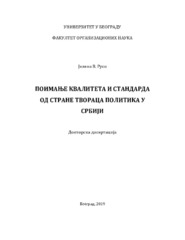Please use this identifier to cite or link to this item:
https://rfos.fon.bg.ac.rs/handle/123456789/109| Title: | Poimanje kvaliteta i standarda od strane tvoraca i politika u Srbiji Quality and standards perception on the part of policy-makers in Serbia |
Authors: | Ruso, Jelena | Contributors: | Filipović, Jovan Miladinović, Slobodan Stojiljković, Zoran |
Keywords: | zakoni;Srbija;kreiranje politika;Infrastruktura kvaliteta;harmonizacija;Evropa;Serbia;Quality infrastructure;policy-making;legislative;harmonization;Europe | Issue Date: | 2019 | Publisher: | Univerzitet u Beogradu, Fakultet organizacionih nauka | Abstract: | U cilju izrade zajedničke platforme za proučavanje procesa kreiranja politika u određenim oblastima, razvijen je teorijski okvir za komparativnu analizu u zemljama Centralne i Istočne Evrope, pre i nakon pristupanja Evropskoj Uniji (EU). Zasnovan na rezultatima opsežnog pregleda literature, ovakav okvir je poslužio kao korisno sredstvo za primenu, sažimajući generalizovano znanje i iskustvo u određenim oblastima kao što je infrastruktura kvaliteta. Komparativna analiza je iznedrila tri ključna zaključka. Prvo, kreiranje politika u zemljama Centralne i Istočne Evrope snažno utiče na postojeće politike i zakonodavstvo EU. Drugo, procesi preuzimanja legislative zahtevaju specifičan nivo posvećenosti, iskustva, znanja i stručnosti tvoraca politika. Na kraju, vremenski pritisak za brzo usvajanje zakona predstavlja još jedno ograničenje za efektivno kreiranja politika. Neuspeh u pravilnom razumevanju ovih propozicija, može imati brojne nenamerne i veoma uticajne posledice. Takvi ishodi u postprijemnom periodu u literaturi se prepoznaju kao "površna evropeizacija", "svet mrtvog slova" ili "Potemkinova harmonizacija", koji se odlikuju formalnim pravilima s jedne, i neformalnim praksama s druge strane. Iako su zajednički problemi transpozicije zakonodavstva EU u zemljama Centralne i Istočne Evrope široko proučavani, naše znanje je još uvek ograničeno na to kako tvorci javnih politika poimaju infrastrukturu kvaliteta u Srbiji tokom procesa pristupanja EU. Kako bi došli do odgovora na postavljeno pitanje, u disertaciji je korišćena triangulacija - metodologija u kojoj se ukrštaju sledeće metode i tehnike: a) komparativna analiza, b) analiza stenografskih beležaka i v) upitnik. In order to build a common platform for studying policy making in some particular fields in the EU pre - and post – accession CEE countries we developed a framework for a comparative analysis of policy-making in these countries. This framework, based on the results of an extensive literature research, has served as a valuable tool to apply, in this way, created generalized knowledge and experience to some particular areas, such as quality infrastructure. The framework rests on three key propositions concerning policy-making in the EU pre - and post - accession CEE countries. These are that policy-making in these countries is strongly influenced by the existing EU policies and legislation; that these processes require a specific level of dedication, experience, knowledge and expertise of the policy-makers and that time pressure is a constraint to successful policy-making projects. Failure to properly understand these propositions can have a number of unintended and highly impactful consequences. Such outcomes in the postaccession period are recognized as ‘shallow Europeanization’, ‘world of dead letter’ or ‘Potemkin harmonization’, which are characterized by formal rules on the one hand, and informal practices on the other. Although the common problems of the transposition of EU legislation in CEE countries are widely studied, our knowledge is still limited about how public policy-makers perceive quality infrastructure issues in Serbia during the EU preaccession process. Aiming to start filling this gap, we employ a triangulation methodology, including a) comparative analysis; b) content analysis of parliamentary speeches and c) questionnaire to come up with the same answer to a single theoretical question. During the survey, special focus was placed on harmonization of Serbian quality infrastructure legislation with that of the EU. The results show that policy-makers are not fully familiar with NQI concepts and that they use them in an inadequate way, often solely for marketing purposes. |
URI: | http://eteze.bg.ac.rs/application/showtheses?thesesId=7239 https://nardus.mpn.gov.rs/handle/123456789/11910 https://fedorabg.bg.ac.rs/fedora/get/o:20980/bdef:Content/download http://vbs.rs/scripts/cobiss?command=DISPLAY&base=70036&RID=515674522 https://rfos.fon.bg.ac.rs/handle/123456789/109 |
| Appears in Collections: | Doktorati |
Show full item record
This item is licensed under a Creative Commons License


